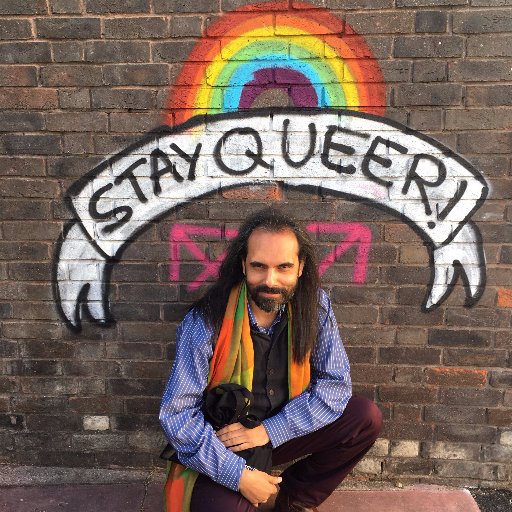31st October 2017, 5 45 pm, Professor Dibyesh Anand who is about to deliver his inaugural lecture in less than 15 minutes can be spotted outside Regent Street Cinema, catching up with academicians, extending a warm welcome to his guests, breaking all conversations to greet his students. 6 pm, the cinema is jam packed with more people scurrying for good seats, the stage is set and is being streamed live on Facebook to over ten thousand of Anand’s followers.
The Deputy Vice-Chancellor (Student Experience) Professor Roland Dannreuther, gives a brief introduction to Anand’s career which encompasses various roles as an academician, lecturer, activist and many other perfectly accomplished feats within and outside the university. Finally, Anand takes the stage, smiling and donning a beautiful ari (Kashmiri embroidery) shawl gifted to him by Parveena Ahangar (Founder of the Association of Parents of Disappeared Persons, Kashmir) and takes us through his journey, right from a baby to today.

Picture Credits-Annapurna Menon
Anand gives us a brief glimpse to his childhood and college days, quickening his pace to reach London, where it seems his first interaction with politics of self-determination begin witnessing protests against Chinese brutalities against Tibetans. A fascinating change for the young Anand whose interest in Tibetan refugee settlements in India was mostly limited to a college get away transformed to an extremely political interest in Tibet. Acknowledging the problems with bureaucratic and institutionalized knowledge, Anand shares his story of researching, teaching and learning within such an atmosphere, and eventually taking the role of Head of the Department of Politics and International Relations at the University of Westminster.
His interest in Tibet eventually resulted in his first book, Geopolitical Exotica: Tibet in Western Imagination which apart from centering on the Tibet occupation also explores identity politics and reviews functioning of postcolonial theory and states. Drawing a map between his personal and professional life, he traces the origin of his second book, ‘Hindu Nationalism in India and the Politics of Fear’ to rage. Essentially going undercover in one of India’s extremist Hindu groups, he analysed them by living with them, potentially taking the most dangerous route.

Credits: Talat Bhat
Deconstructing his own identity as queer, Anand explores the meaning of ‘Queering postcoloniality and its importance’. Hell bent on questioning well-defined norms, Anand talked of queering the post-colonial with a three-step process. He asked the audience to queer the self; “unqueer the queer”, focusing on challenging imposed identities. Redefining the term from its hetero-normative lens, the second step involves queering the nation which involves and important understanding of formation of nations that is based on a stark differentiation of the self and ‘other’ and taking steps to continue a violent expulsion of the ‘other’. The final step involves decolonizing the state of mind, an excruciating process involving more unlearning than learning, where one has to “acknowledge the coloniality but not affirm it”.
Anand is unapologetic about his views and does not mince his words. His lecture was no different, using real images that displayed conflict, his family, his supporters and haters, his eagerness to be an active learner, his fight with mental health, and a heartening image of him with a small baby in Kashmir, his inspiration to strive forward every single day with work that’s impact and change driven. Anand’s unconventional choices and focus on conflict areas have, according to him, made him more empathetic but it has also made him a voice of the voiceless and a defender of their rights. His thank you note, similar to the image of a field full of yellow flowers bathed in sunlight that he used, felt heartening and warm. The audience broke out in applause, enraptured by the entire last hour.

Credits: Talat Bhat
7:05 pm. Anand is right in the middle of an ocean of his audience, being showered with compliments, questions, congratulations. The guests are indulging in wine and chips, waiting to speak to Anand. He looks relaxed yet enthusiastic, making time for every single person who’s wanting to speak to him, patiently addressing their questions and gratefully thanking them for their presence and compliments. We wonder if he knows how many people, not just the audience but the thousands of followers on social media, globally, he’s inspired today with his words, and more importantly his tireless work as a voice of resistance and dissent.
